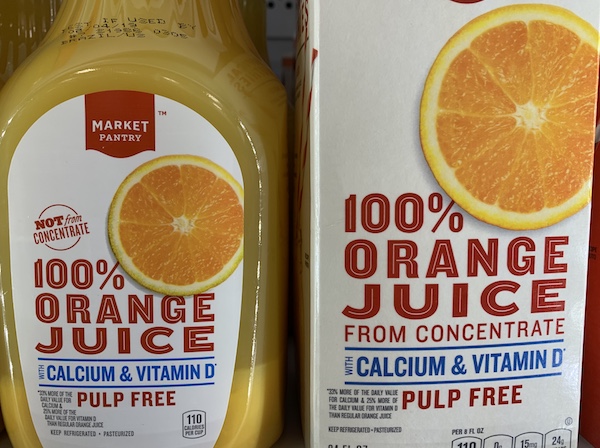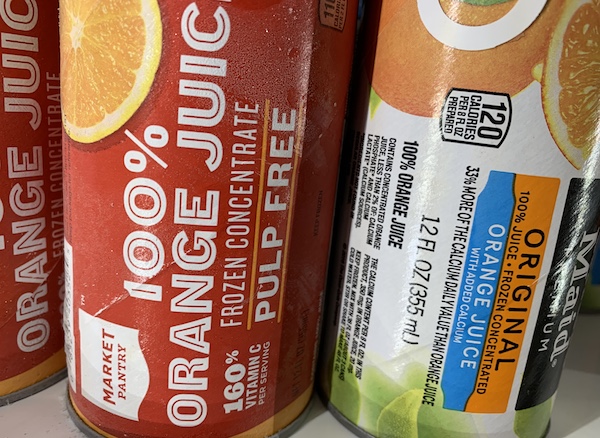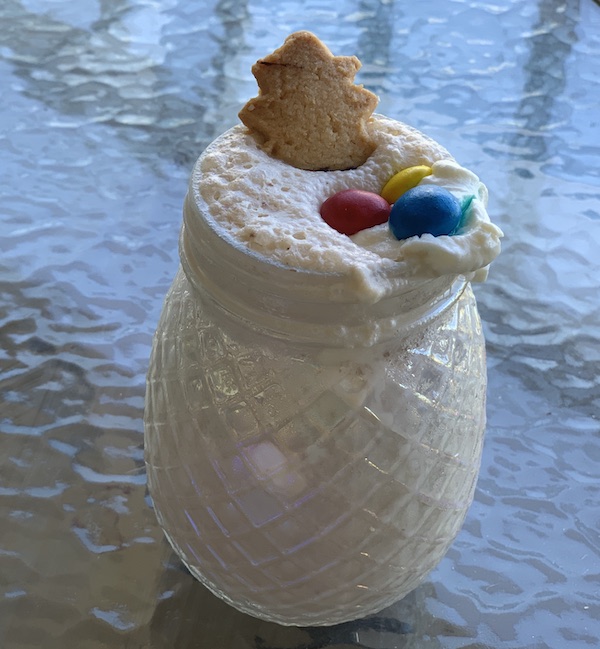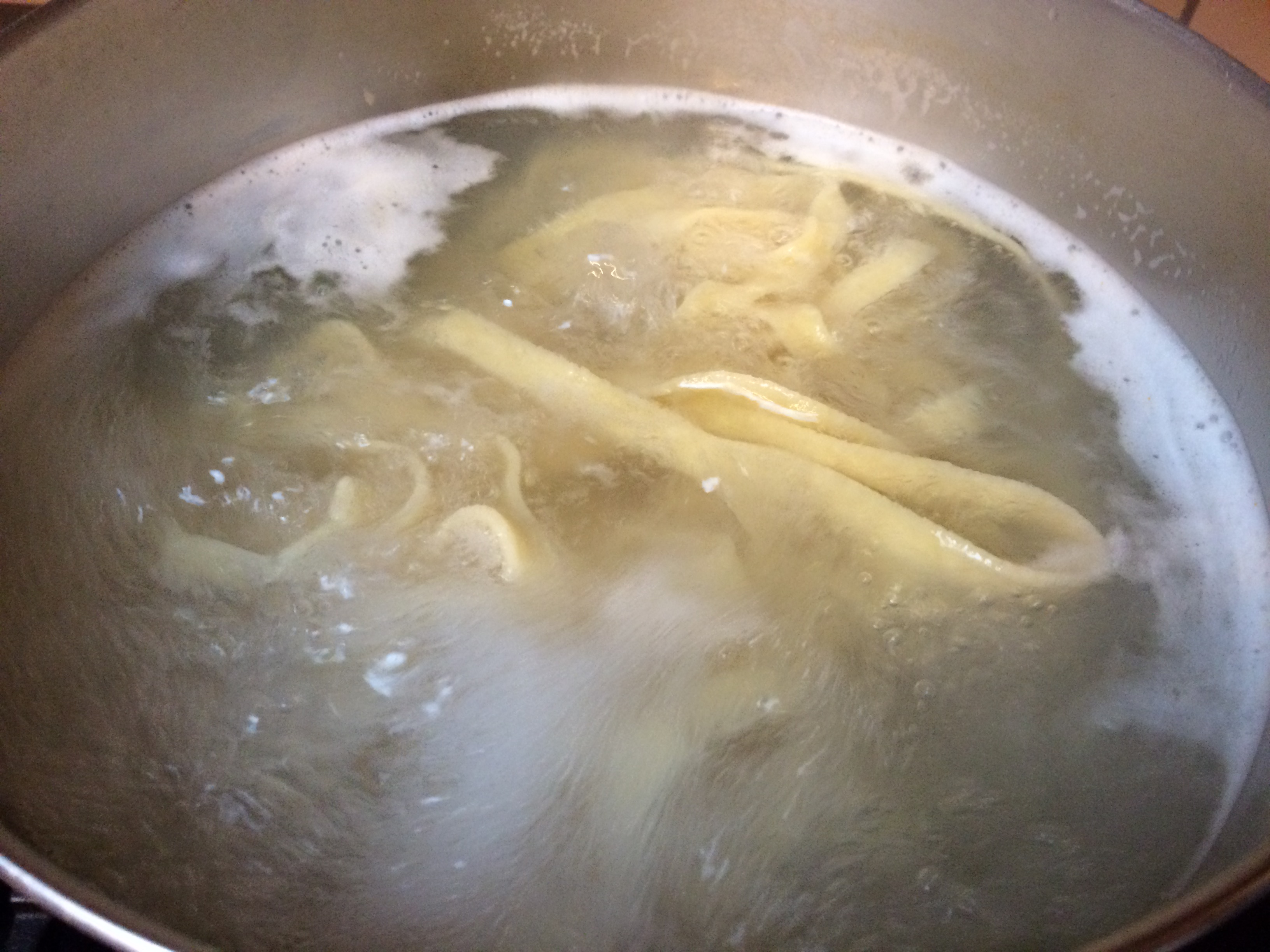With Juices, What Does From Concentrate Mean?
What does “from concentrate” mean? What does “made from concentrate” refer to on a juice label? What does “not from concentrate” mean?
Answer:
Made “from concentrate” and “not from concentrate” labels let you know how a juice or coconut water was processed. These terms are recommended with guidelines written by the Food and Drug Administration (FDA).

With Juices, What Does 'From Concentrate' Mean?
Definition of From Concentrate / Not From Concentrate
Natural juice that is squeezed directly from the fruit and packaged without adding anything else is “100% natural juice” and also “not from concentrate”. This is the freshest tasting juice you can find, without actually squeezing the fruit yourself.
When a concentrate is made from natural fruits, all of the excess water is extracted from the fruit using a heat and pressure process. This makes the resulting juice about 7 times more concentrated than simply extracting the juice straight from the fruit. The product is then pasteurized and packaged. For drinking purposes, water must be added back in to the concentrate either at the factory, in which case the container would then be labeled “made from concentrate”, or at home (if it was purchased as a straight “concentrate”). Concentrates are usually frozen and purchased in tubular containers in the freezer section.

Is it necessary to use the term “concentrate” on
the label?
Juices made from concentrate must be labeled with
terms such as “from concentrate,” or “reconstituted”
as part of the name wherever it appears on the
label. An exception is when the juice appears in the
ingredient statement, the juice can be declared as
“concentrated ^^^^ juice and water” or “water and
concentrated ^^^^ juice,” as appropriate. 21 CFR
102.33(g)
[1].
If the juice is 100 percent single species juice consisting of juice directly expressed from a fruit or vegetable whose Brix level has been raised by the addition of juice concentrate from the same fruit or vegetable, the name of the juice need not include a statement that the juice is from concentrate. However, if water is added to this 100 percent juice mixture to adjust the Brix level, the product shall be labeled with the term “from concentrate” or “reconstituted.” [2].
Is one healthier than the other?
As long as no additives or preservatives are added
to the concentrate, the two products are pretty
equal in health benefits. Look for either “not
from concentrate” on the label to ensure
straight juice or “100% juice from
concentrate” on the label to ensure juice with
water, and nothing else in the ingredient list.
If the product label says “punch” or
“beverage” or anything other than 100%
juice, then the product has additives and
preservatives.
The additives almost always include some form of
sugar, which adds calories to the product.
Which juice has the longest shelf life?
Juices “from concentrate” will
have a longer shelf life. Concentrates can be frozen
and then reconstituted a year later. “Fresh
squeezed” juice, actually fresh squeezed and
then placed directly into a container, will spoil
first. “Not from concentrate” juices
will last a little longer because they have gone
through a flash pasteurization process. Juices
“from concentrate” will last a little
longer yet since they have been fully pasteurized.
The actual concentrate with all water removed will
last the longest of them all.
The juice process begins with fresh fruit arriving at a processing plant. There it is washed, sorted and then fed into a machine that quickly extracts the juice from the peel and pith. If it will become concentrate, it is sent to an evaporator and then to the pasteurizer. If it will become “not from concentrate” it is sent directly to the pasteurizer where high temperatures kill off bacteria and deactivate enzymes (thus extending the shelf life). If it will become a more premium juice it goes through a flash pasteurization, which means a shorter process at a lower temperature than the full pasteurization process, leaving a tastier product. This doubles the shelf life from actual fresh squeezed without any pasteurization, but is only about half the shelf life of a fully pasteurized juice.
Which juice is more cost effective?
Juices from concentrate will cost less than
those not from concentrate due to less processing
needed to produce the product and the increased
shelf life of the resulting product.
Which one makes the best choice?
So, now that you know
what concentrate means on a juice label,
decide which is the best pick for the task at hand.
If you are using the juice for cooking, it really
doesn’t make much difference which one you
choose. If cost and shelf life are important, then
concentrate is the best option. But, if you’re
choosing the juice for drinking pleasure, there is a
taste difference. The “not from
concentrate” product is a natural juice so it
just tastes fresher and more like the actual fruit
(after all, it is actually the juice extracted
straight from the fruit) whereas the heat of
pasteurization destroys some of both the flavor and
aroma.
With Juices, What Does 'From Concentrate' Mean?
Additional Information
To understand other common food labeling terminology, see our how to read food labels post.










